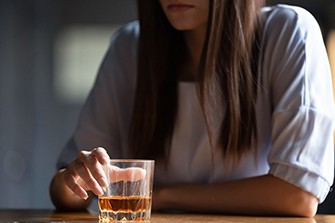Can Drinking Age Your Brain? USC Study Says Yes
Drinking alcohol can cause a variety of damage to your brain and body, but can it actually age you? According to a study by researchers at the University of Southern California (USC), the answer is yes.
In a new article by Microsoft News, drinking alcohol can cause actual aging effects and that every gram of alcohol consumed per day ages the brain 0.2 years—or approximately one week.
Can Drinking Age Your Brain? What the Experts Say
Here is a breakdown of the study:
- Scientists looked at brain scans of 17,308 people between the ages of 45 to 81.
- The researchers collected data from the participants on how much they self-report to drink and smoke.
- They programmed a computer to be able to determine the ages of the brains in the scans.
- They compared the brain scans to the participants’ actual ages.
- Results showed that as little as one gram of alcohol consumed per day ages the brain 0.2 years (about a week).
- To put it into perspective, a standard glass of wine or bottle of beer contains about 14 grams.
What Alcohol Does to the Brain
Alcohol can impair decision-making, mood, impulse control, and more when consumed to excess. But what exactly does alcohol do to the brain to make people act this way?
The two areas of the brain affected the most by alcohol are:
- The hippocampus. This area of the brain is responsible for memory and learning. Studies of adolescents show that heavy and extended alcohol use is associated with a 10 percent reduction in the size of the hippocampus. It also shows that the function of the hippocampus is uniquely sensitive to alcohol at this time and that alcohol may be poisonous to the nerve cells of the hippocampus causing them to be damaged or destroyed.
- The prefrontal lobe. This area of the brain is important for planning, judgment, decision-making, impulse control, and language. In addition, it is the area of the brain that changes the most during the teenage years. Research with heavy drinking adolescents shows that these young people have smaller prefrontal lobes than young people of the same age who do not drink.
Alcohol can disrupt, or completely block, communication between brain cells. This is what causes impaired balance, blurry vision, slurred speech, memory lapses, and more. As heavy drinking continues, the brain essentially adapts to these blocked signals, which cause the brain to over-activate neurotransmitters.
Once the drinking binge has ended, the overactive neurotransmitters shrink and cause uncomfortable side effects, also known as a hangover, and these neurons die which can lead to brain damage if this cycle is frequently repeated.
Facts About Drinking
- For men, binge drinking is defined as consuming five or more drinks within about two hours, and for women, it’s defined as consuming four or more drinks within about two hours
- 1 in 6 U.S. adults reported binge drinking in 2015
- Excessive alcohol use is the fourth leading preventable cause of death in the United States
- Not all people who binge drink suffer from alcohol use disorder
- People who begin drinking before the age of 15 years are five times more likely to become dependent on alcohol than those who begin drinking at or after the age of 21 years
How to Avoid Binge Drinking
If you drink alcohol, there are precautions you can take to avoid binge drinking and minimize the damage and impact that alcohol has on your brain. These precautions can include:
- Eating before, during, and after drinking alcohol to slow the absorption of alcohol
- Drinking one alcoholic beverage per hour
- Drinking water during and in between alcoholic beverages
- Stopping after 2-3 drinks to avoid extreme intoxication
How Do You Want Your Brain to Age?
When it comes to alcohol consumption, there are many factors to consider for why not to do it. Now, one of them could be more about helping your brain age well.
About Cliffside Malibu
Since no two addictions are the same, we develop individualized treatment plans for every client at Cliffside Malibu. We are committed to providing evidence-based treatment through a continuum of care model across a range of levels of care, including medically supervised detox, residential treatment, day treatment and outpatient services. Our program includes family therapy and holistic therapy, as well. Whether an individual has substance abuse and/or alcohol addiction, our programs are structured to create a supportive environment where healing can begin.
In addition to world-class treatment, Cliffside Malibu offers luxury accommodations, a serene environment, five-star dining and plentiful amenities. We understand that addiction treatment is a rigorous process. Therefore, we provide for your comfort and relaxation at every turn, allowing you to rejuvenate, and meet the demands of treatment with your greatest energy and attention.
For more information on Cliffside Malibu, visit cliffsidemalibu.com.
